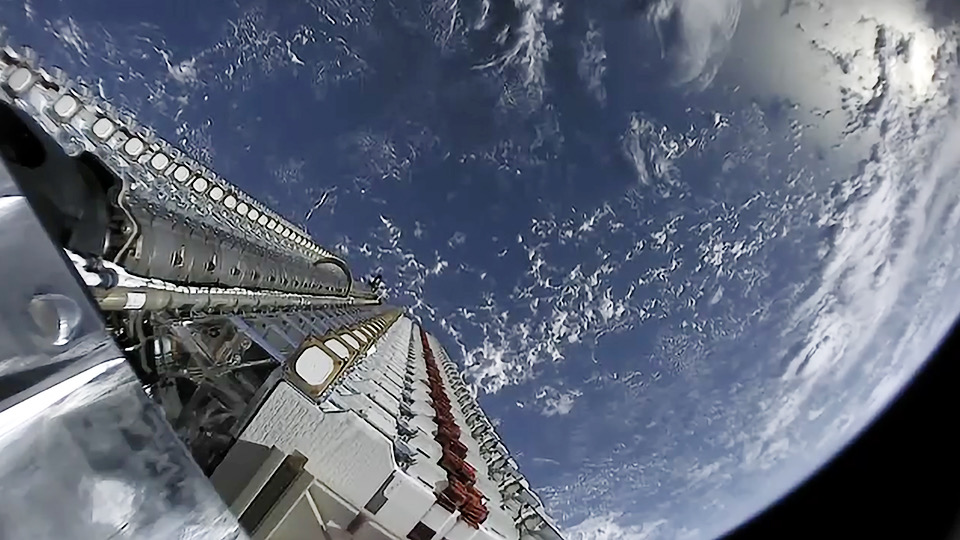SpaceX and OneWeb satellites didn't have a close call in space after all: report

It turns out that the recent "near miss" collision between two SpaceX and OneWeb internet satellites in orbit wasn't a "close call" at all, and the satellites weren't actually in danger of crashing, SpaceX has revealed.
On March 30, OneWeb reported several "red alerts" from the 18th Space Control Squadron (18 SPCS) of the U.S. Space Force, indicating a 1.3%change that a OneWeb satellite might collide with one of SpaceX's Starlink satellites. A satellite crash could create dangerous debris in orbit and possibly lead to other collisions, so this was an obvious and immediate concern. Thankfully, the two satellites passed by each other without getting dangerously close.
However, in a recent letter filed from SpaceX to the FCC, signed by David Goldman, SpaceX's Director of Satellite Policy to Marlene H. Dortch, the Acting Director of the Office of Communications Business Opportunities of the Federal Communications Commission (FCC), SpaceX stated that "Despite recent reports to the contrary, the parties made clear that there was no 'close call' or 'near miss.'"
In fact, SpaceX asserted in the letter that OneWeb officials "chose to publicly misstate the circumstances of the coordination" and now are offering to "retract its previous incorrect statements." This letter was first reported by CNBC reporter Michael Sheetz on Twitter.
SpaceX and OneWeb are each developing vast megaconstellations in orbit to provide global internet coverage from space. To date, SpaceX has launched more than 1,440 of its Starlink satellites while OneWeb has launched 182 satellites, 36 of which just launched into orbit on Monday.
Related: SpaceX's Starlink satellite megaconstellation launches in photos
SpaceX, in an FCC filing, says there was no "close call" between a Starlink and a OneWeb satellite last month:OneWeb "chose to publicly misstate the circumstances of the coordination" and have now offered to "retract its previous incorrect statements."https://t.co/TNJrHMShwY pic.twitter.com/ZV4dz15P65April 21, 2021
"SpaceX expressed its disappointment to the Commission that OneWeb's officials chose to publicly misstate the circumstances of the coordination," SpaceX stated in the letter. "SpaceX was therefore grateful that OneWeb offered in the meeting with the Commission to retract its previous incorrect statements."
Breaking space news, the latest updates on rocket launches, skywatching events and more!
However, OneWeb hasn't made this retraction. "OneWeb made no such offer to retract any previous statements made to the press," OneWeb said in a response letter it filed with its legal firm Sheppard Mullin. "OneWeb simply noted during the meeting that press coverage can sometimes be erroneous in certain respects – a fact noted by SpaceX itself when requesting the FCC meeting in the first place. OneWeb stands by its story as reported to the press."
The letter from SpaceX contends that the probability of collision was never so high that they couldn't have fixed it with a maneuver in-orbit. And the two companies did orchestrate a maneuver to decrease the probability of collision. However, "the satellites would not have collided even if no maneuver had been conducted," the letter reads.
"OneWeb's misleading public statements coincide with OneWeb's intensified efforts to prevent SpaceX from completing a safety upgrade to its system," the letter continues. "For instance, immediately after the first inaccurate quotes came out in media accounts, OneWeb met with Commission staff and Commissioners demanding unilateral conditions placed on SpaceX operations."
These media statements referenced in the letter were made by OneWeb's head lobbyist, according to a fact sheet about the event provided by SpaceX from a conference call on April 20, which is available within the same letter to the FCC.
Additionally, in the fact sheet, it was stated that 18 SPCS and LeoLabs, Inc., a company that provides space debris tracking services, reported significantly different distances between the two satellites. 18 SPCS reported a distance of 3,674 feet (1,120 meters) while LeoLabs stated it was 3,517 feet (1,072 meters).
SpaceX also name-drops satellite operator Viasat in the letter, suggesting that miscommunications such as this are jeopardizing safety in space overall.
"Both Viasat and OneWeb have argued forcefully that they should be exempt from Commission rules for orbital debris mitigation due to their status as non-U.S. operators," the letter states. The letter continues and urges the FCC to act on a SpaceX petition that the company has put forth to extend the FCC's orbital debris for all companies operating in orbit around Earth.
Currently, there is no global or even national, regulation or organization that could mandate satellite operators like OneWeb or SpaceX to move satellites or conduct specific maneuvers if there is a risk of collision. However, SpaceX recently signed a Space Act Agreement with NASA to steer its Starlink satellites out of the way of the International Space Station or any other agency spacecraft if they get too close. This is a major shift as, just last year, the orbiting lab had to adjust its orbit a number of times to avoid potential collisions with objects in orbit.
Email Chelsea Gohd at cgohd@space.com or follow her on Twitter @chelsea_gohd. Follow us on Twitter @Spacedotcom and on Facebook.

Chelsea “Foxanne” Gohd joined Space.com in 2018 and is now a Senior Writer, writing about everything from climate change to planetary science and human spaceflight in both articles and on-camera in videos. With a degree in Public Health and biological sciences, Chelsea has written and worked for institutions including the American Museum of Natural History, Scientific American, Discover Magazine Blog, Astronomy Magazine and Live Science. When not writing, editing or filming something space-y, Chelsea "Foxanne" Gohd is writing music and performing as Foxanne, even launching a song to space in 2021 with Inspiration4. You can follow her on Twitter @chelsea_gohd and @foxannemusic.
